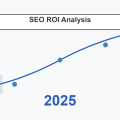If you are a business owner, content creator or work in marketing, chances are Google’s recent algorithm changes concerning AI generated content are making you feel a little nervous. The March and June 2025 updates have sent many websites into a panic with some seeing traffic drop by up to 70% whilst others have watched their profits plummet by 75%.
So here’s the burning question; should you use AI for your website content and blog posts?
The answer isn’t a simple yes or no. Google isn’t starting a war against all content that has used AI to write it, they are going after lazy and manipulative content practices. Google’s focus is firmly on quality, helpfulness and user intent, regardless of how the content was made.
In this post we’ll break down what Google’s latest updates actually mean for AI content, discuss the real data behind the penalties and give you a clear roadmap for using AI without risking your search rankings.
Whether you already use AI in your daily life or you’re just getting started, we’ll walk you through some strategies to make sure your content wont negatively impact your site.
What Google says about AI Content:
Google has explicitly stated that they don’t penalise AI content simply because it was created by artificial intelligence. In Googles own words, “Not all AI-made content is bad. AI has long been used to make helpful things like sports scores and weather reports.”
The search engine’s official stance is that content quality and usefulness matter more than the creation method. Whether the article was written by AI, a human or a mix of both, doesn’t affect its ranking scores.
While Google doesn’t have an overall ban on AI content, they do care a lot about content that’s been produced “at scale for the primary purpose of manipulating search rankings.”
They’re specifically targeting content that’s “low-quality, unoriginal, and unhelpful”. AI content that is produced without human editing is viewed thsi way by Google.
The main workings behind this AI content crackdown is Google’s “Scaled Content Abuse” policy, which targets mass-produced, low-value content that’s more often than not generated by AI tools.
So if you are generating hundreds of pieces of content from a generic prompt and then not reading, editing or adding real life value to the content before posting, then chances are your content falls under this category.
The March 2025 Core Update: A Broad Cleanup
Rolling out from March 13 to March 27, this update was described as “regular” by Google, but the SEO community felt anything but regular volatility.
The update focused heavily on “Helpful Content” principles and strengthened E-E-A-T (Experience, Expertise, Authoritativeness, Trustworthiness) signals.
What made this update particularly significant was Google’s aggressive de-indexing of millions of pages deemed low-quality. That means all content that fell under this such as empty category pages, doorway pages, duplicate content, and “zombie” blog posts, (articles with no traffic or backlinks) were all removed from search results.
Three new spam policies were introduced:
Expired Domain Abuse: Buying expired domains and stuffing them with irrelevant content
Site Reputation Abuse: Authoritative sites hosting unrelated third-party content with minimal oversight
Scaled Content Abuse: Mass-producing content primarily for ranking manipulation
The June 2025 Updates: Precision Strikes
June brought two distinct updates. Firstly, there was a Spam Update (June 20-27), which refined existing spam detection methods, emphasising common violations such as automated content and thin duplicated material.
Compared to the March update, which made broad widespread change, this one was more targeted and precise.
One major change was that Google made its helpful content system part of the core ranking algorithm. Now content is judged based on each individual page not the overall brand or website.
The most significant development? “The Great Decoupling.”
This phenomenon describes when websites started to see more impressions on their site but significantly less clicks. The reasoning behind this?
Google’s AI Overviews (formerly Search Generative Experience) started answering questions directly in search results which reduced click through rates by 18-64%.Sites might be cited in the AI answers but there is still a loss of the valuable click through traffic that comes with ranking.
How to Use AI for SEO:
The key to success with AI is using it to help you to be more efficient rather than replace your workload all together. Heres a few tips to help you:
Human Touch
Every piece of content that has been made by AI platforms must be read over and checked by a human. You need to ensure that you heavily edit your work and fact-check, because artificial intelligence is notorious for making up facts and making mistakes. Adding personal insights adds a personal feel to your content. Be sure to include your own personal experiences from thoughout your life or studies where you can.
The Quality Rater Guidelines now looks for low-effort AI content. This means it looks for widely known facts and if your page has alot of overlap with another famous site such as Wikipedia. It is also developed to detect phrases that are used often by AI.
Build E-E-A-T Content
If you work in digital marekting then I hope you already know what E-E-A-T stands for. But dont owrry if you dont – we are here to help. It stands for Experience, Expertise, Authoritativeness, and Trustworthiness. So if you want to make high quality content that passes Googles alorgithm updates then produce your content following these steps:
Experience: Share examples from your life and include real case studies.
Expertise: Include author bios with relevant credentials, cite good sources and try to demonstrate your deep knowledge about your topic of choice.
Authoritativeness: Make sure to have strong relationships with other people in your field, earn strong backlinks and get mentioned by other respected publications.
Trustworthiness: Maintain transparent About Us and Contact pages, include privacy policies and show customer reviews so potential new customers can see real life exepriences with your business.
Valuable Content
This means actually solving problems. Google loves if you can add value to your clients so when you’re checking your content, ask yourself: 1. Does this content genuinely help someone? 2. Am I providing information that can’t be found elsewhere? 3. Would I find this useful if I weren’t trying to rank for keywords?
Avoid generating lots of generic content that is widely available on the internet or basic knowledge. Instead try writing content that’s original and offers new perpectives on topics and try to include original research where you can.
Optimise Strategically for AI Overviews
- Use H2 and H3 headings that answers questions
- Structure content to support decision making rather than just basic information
- Make a FAQ section so your answers can be featured
- Write content that encourages clicking through to read more
Practical Steps to Audit and Improve Your Website
Content Audit
Use a platform such as Google Search Console to find pages that have lost traffic or rankings since March. Look for things like what content is doing worse than others? Do you have multiple pages targeting similar keywords? Which pages have little to no organic traffic?
Take Action Based on Your Findings
Refresh and Improve: Update the outdated information on your site and add depth to weak articles and incorporate new information. Making sure to refresh your website every year with new articles and pages with new statistics shows Google you are up to date.
Consolidate Wisely: Rewrite multiple weak articles into stronger and more comprehensive guides. This normally works better than having multiple weak pages competing against each other.
Remove Without Hesitation: Delete or rework pages that dont offer value. This means empty category pages and articles that haven’t attracted any engagement.
Strengthen Technical Foundations
While your content is extremely important you want to make sure your technical side of things are up to date aswell. You can ask an SEO company to help you with this if it seems unfamiliar to you.
- Check loading speeds across all devices
- Verify your site works on mobile phones
- Review internal linking structure
- Monitor Google Search Console for crawling issues or manual actions
Diversify Your Traffic
An important piece of advice would be to start relying less on Google’s organic search. The way organic search has traditionally worked is changing forever so make sure you dont have all your eggs in one basket.
Start by building email lists and make social media accounts to boost your online presence in differnet ways. If you create social media accounst you have an easy way to stay in touch with your potential customers. Clients can comment on your posts which you can reply to and they can even direct message you with any questiosn they may have.
Having multiple traffic sources means protection against future algorithm changes that may affect organic traffic rankings.
Moving Forward in the New SEO Landscape
The March and June 2025 updates showed more than algorithm tweaks, they signal a fundamental shift in how Google works. AI Overviews are changing the way users use Google and Google’s standards for your contents quality just keeps getting higher.
The bottom line
Focus on creating helpful content that shows real expertise and has value. Use AI to help you write, not to replace the whole writing process.
You need to prioritise providing value to those reading your site. Set up social media accounts so you can build a digital presence that doesn’t rely solely on Google.
If these changes are stressing you out or you need help conducting a comprehensive content audit, our team specialises in helping businesses through the evolving SEO landscape. We can help you develop a personal strategy for your business.
For those who want to dive deeper into the specifics of Google’s March and June 2025 updates, including detailed data and community observations, you can access our Google Updates and AI Content_ that informed this analysis.






